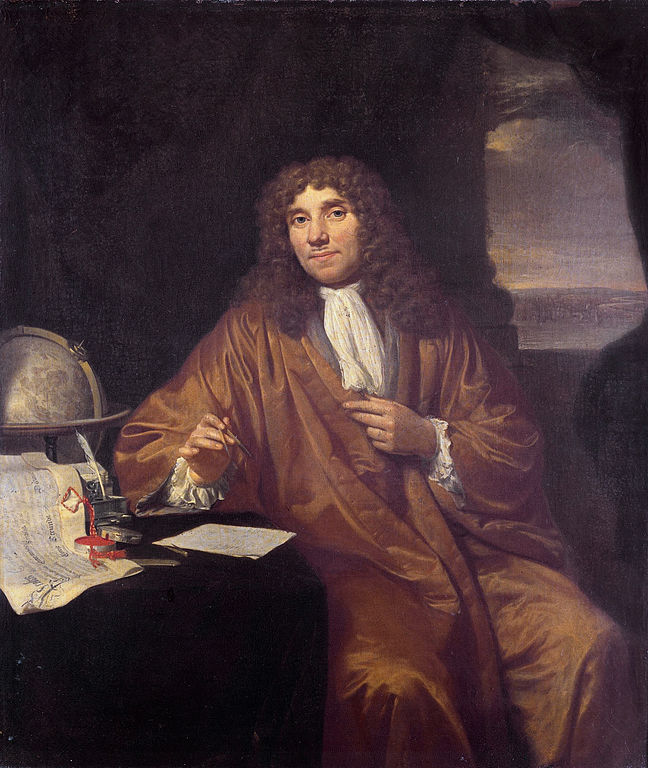| Anton van Leeuwenhoek | |
|---|---|
 |
|
| Microbiologist | |
| Born | Oct. 24, 1632 Delft, Dutch Republic |
| Died | Aug. 26, 1723 (at age 90) Delft, Dutch Republic |
| Nationality | Dutch |
Anton van Leeuwenhoek is definitely one of the most important figures in the history of science. The Dutch-born van Leeuwenhoek has been called the Father of Microbiology. His studies in this area of science have greatly contributed to much of what modern science is built upon. He was a true trailblazer from his era and all accolades he has been awarded are well-deserved.
Early Years
Anton van Leeuwenhoek was born in Delft, Netherlands, on October 24, 1632. His father died when young Anton was only five. His mother would remarry and Anton had a good and stable home life. His life was somewhat humble and, when he was a teenager, he went on and became a linen-draper’s apprentice.
He eventually started his own shop and became involved in politics. He would become a municipal chamberlain and this would afford him a rather lucrative income for the bulk of his life.
This might seem like an atypical life for someone who later became famous in the world of microbiology. In a sense, it could be said his work in the field derived from a hobbyist pursuit.
Leeuwenhoek’s Microscope
As proprietor of his drape shop, van Leeuwenhoek developed an interest in lens making. He also had an interest in microscopes. While melting soda lime glass on a hot flame, he created a unique new lens that could be used in a microscope. Reinier de Graaf, a highly skilled Dutch physician, was a close friend of van Leeuwenhoek. Anton van Leeuwenhoek showed his new discovery to de Graaf who then aided in bringing greater attention to the microscope to the scientific community.
The British Royal Society
Van Leeuwenhoek started to dabble and experiment with his microscope. He made some very unique discoveries as a result. When the British Royal Society, in its publication Philosophical Transactions, was made aware of his studies of mold, lice, and bees, the editors were very impressed. It seemed this shop owner had created the most revolutionary microscope in the world of science.
His relationship with the British Royal Society would eventually suffer when he sent them a report of his study on single cell microorganisms. While his work was visionary and brilliant, it was not exactly thought to be accurate. In fact, the members of the British Royal Society rejected his report. Over time, the relationship between the various parties was smoothed over when it was revealed van Leeuwenhoek’s studies were both accurate and revolutionary.
Leeuwenhoek Achieves Fame
During the 17th century, it is generally believed van Leeuwenhoek achieved the highest level of fame of any scientist who was alive at the time. This definitely brought about some jealously on the part of his peers. He was constantly visited by the press and members of the political class.
Anton van Leeuwenhoek was a shrewd man, however. He cared to not reveal too much of his work to those who visited him, for fear that they might steal his material. As such, he only showed them his older microscopes instead of his high end prototypes.
An Amazing Body of Work
Even a cursory examination of the body of work of van Leeuwenhoek reveals he was one of the most consistent researchers and innovators in his field. Over the course of his life, he was able to create 25 different microscopes and 500 different lenses. Interestingly, his microscopes were not the giant ones but were somewhat minuscule in size.
He was also able to make quite a number of major discoveries over the course of his life. Among the most impacting of his discoveries were various bacteria and protists, the vacuole, spermatozoa. His examination of muscle fibers was able to reveal the presence of banded patterns within them.
The Death of van Leeuwenhoek
Anton van Leeuwenhoek lived a very long life. He would pass away at the age of 90 on August 26, 1723. His legacy as one of the greatest biologists in history is well deserved. His work forever changed how the field of microbiology is studied.